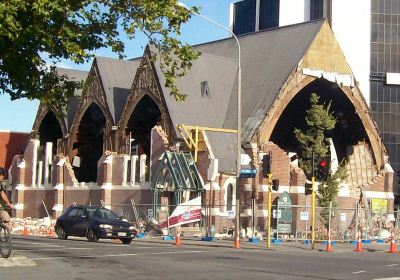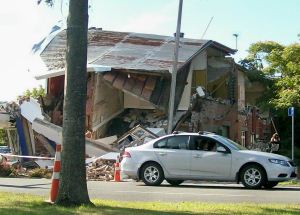Trials: Blessing in Disguise
Late last year, Australia experienced the worst floods in our history, followed by cyclones, while other parts of the country have had devastating bushfires. Property has been destroyed, homes ruined, lives have been lost. We have witnessed surges of water hurling cars as if they were toys, washing some houses away, wrecking others, uprooting trees, destroying roads, railway lines and bridges. It has been tragic, sad, and heartbreaking.
Yet in the midst of it all, we have also seen amazing courage, selflessness, cooperation and service. People standing in the midst of their ruined homes, facing the loss of possessions, valuables and the work of a life-time, have smiled, cried, smiled again, and said that life goes on. They have pitched in to help strangers and communities. Neighbours who had previously had only a nodding acquaintance with one another cleared muck from one another’s homes together. The “Mud Army” of volunteers embodied the spirit that rose in response to the challenge presented by this devastating natural calamity.
In a crisis, we know, deep down, that people matter more than things. Indeed, at such times it seems we can be clear and certain that family, friends, mateship, community and helping one another are the things that really matter.
Terry Sweetman, writing in the Sunday Mail (January 16, 2011), after describing his own experience with the Brisbane flood, expressed it cogently: “Materially we are briefly impoverished. Spiritually we are enriched—now and forever. In exchange for some trinkets and trash devoured by flood waters, we have found some treasures we have forgotten existed…. My pledge is that we will never again neglect the garden of friendship from which we have harvested so much kindness.”
In the Sermon on the Mount, probably the best known of Jesus’ teaching, Jesus makes the observation that life is more than possessions and eating and drinking. He isn’t saying that eating and drinking, and our material possessions, are unimportant, just that there is more to life than these things. He isn’t condemning working, earning, going into business, saving, building a house. He is saying that there is more to life than these things.
Deep down, we know this to be true. In times of crisis, the distractions and details of everyday life, the tyranny of the urgent and the pressures of the present seem to fall away and we see, just that much more clearly, just how true it is—life is more than things. What really matters are our relationships.
God is a relational Being. He is love. And deep down in the human heart there is a need for friendship, fellowship, relationship—a need for love. We know it. We get so busy we forget it, or so distracted by the teeming trivia of life that we are not conscious of it, but we know it to be true.
The story of the Bible is not about a harsh, judgmental God who can’t wait to smite us. It’s about a God who reveals himself in Jesus as one who endures all the reality of human life along with us—its ups and downs, pain and celebrations. It’s about a God who loves us, and in his grace wants to share his life with us. It’s good news in the midst of all the bad news.
Scientists tell us that we are at our happiest when we are helping others. Interesting, isn’t it? Not when we are busy accumulating, acquiring, defending, and protecting the “stuff” of life. When Jesus encourages us to seek first his kingdom and his righteousness, he is talking about our focus, our priorities, in life. And then he says we won’t need to worry about all the other stuff—it will be provided.
He is telling us how to simplify the complexities in life—by prioritizing the things that really matter.
If life is truly more than material trinkets and trash, why do we spend so much time and effort dedicated to their pursuit? If the treasure of life is spiritual, relational, why not make that our focus and priority? And at the heart of this is the treasure of a relationship with God. “Your Father has been pleased to give you the kingdom,” Jesus said (Luke 12:32).
The kingdom is relational—sharing the life of the Father, Son and Spirit. Through Jesus, we share in this life, and in this righteousness. (It’s not a matter of working harder to become more righteous by ourselves—it’s participating in the righteousness of Christ.) No wonder Jesus’ repeated admonition here is “don’t be overly anxious,” or simply, “don’t worry.”
If our priorities are spiritual, kingdom-focused, we can get on with life—a life of love and service. Through his incarnation (becoming one of us), Jesus has redeemed all of life, so we can by all means enjoy the physical while we have it, but at the same time we can set our hearts on the imperishable, the permanent, the eternal. Life is more than stuff, possessions. It’s about people, grace, kindness and love. It’s about enjoying relationship with God and one another.
Why wait for a crisis?
John McLean, 2011
Photos: Wikimedia
And Also New Zealand
 A catastrophic earthquake struck Christchurch, New Zealand, on February 22. This relatively shallow 6.3 magnitude earthquake, the second to rock the city in less than six months, hit near central Christchurch at 12:51 p.m. on a Tuesday when the city’s buildings and streets were full of people and traffic.
A catastrophic earthquake struck Christchurch, New Zealand, on February 22. This relatively shallow 6.3 magnitude earthquake, the second to rock the city in less than six months, hit near central Christchurch at 12:51 p.m. on a Tuesday when the city’s buildings and streets were full of people and traffic.
 Half the brick buildings in Christchurch’s central business district were irreparably damaged. The death toll neared 200. Stories and video have abounded of tragic loss, near misses, harrowing escapes, and a community of people who have pulled together to help with the recovery.
Half the brick buildings in Christchurch’s central business district were irreparably damaged. The death toll neared 200. Stories and video have abounded of tragic loss, near misses, harrowing escapes, and a community of people who have pulled together to help with the recovery.
The Kiwi mindset of “just getting on with it” has meant that police, armed forces, ambulance, fire brigades, and an army of citizen volunteers (including thousands of university students) cordoned off the teetering buildings in the city’s core, provided security, fed and housed displaced residents, and shoveled up an estimated 100,000 tons of liquefaction (wet sand and silt forced up to the surface through even the tiniest cracks in pavement).
Support and personnel have poured in from across New Zealand and around the world. Remarkably, there has been minimal looting, and next to no public violence.
Christchurch Cathedral’s Dean, Peter Beck, praised the kindness people had shown each other throughout the disaster. He said, “People are reaching out to one another, talking to one another, giving each other food… that’s what it’s all about. You often see in these worst of times the best in human beings.”
Phil Baldwin, 2011
